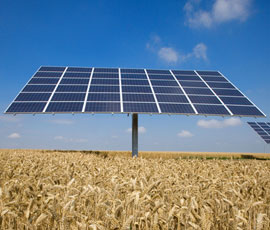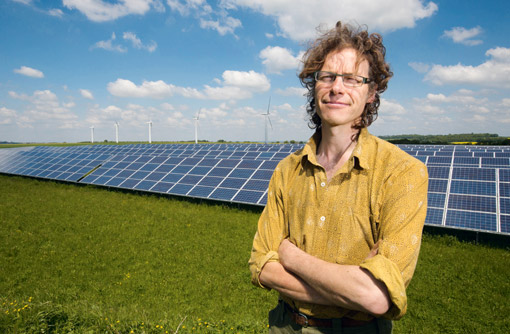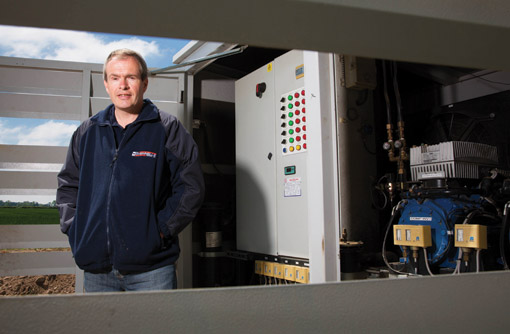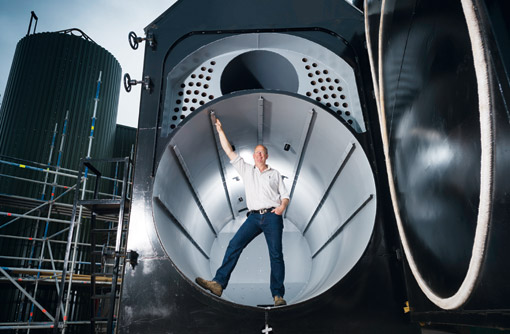2013 Farmers Weekly Awards Green Energy finalists revealed

Whether it be collaboration with the local community, exemplary energy efficiency or using renewables technology to reinvigorate an existing farm business, all three finalists for the 2013 Farmers Weekly Awards Green Farmer of the Year demonstrate how agriculture and renewables can go hand in hand. Gemma Mackenzie reports

Adam Twine
Colleymore FarmColeshill, Oxfordshire
Many would think overseeing and directing the planning and construction of the UK’s largest community-owned wind farm would constitute “doing your bit” for green energy generation. However, for Adam Twine, this was only the beginning.
Building on the success and learning behind the 6.5MW wind farm – installed five years ago following 12 years of relentless work to get the community on board, as well as an expensive and lengthy planning process – Adam has gone further and created the largest community-owned solar farm in the UK on his 485ha organic farm.
Sitting alongside the five 1.3MW turbines, which are owned by more than 2,500 people through the Westmill Wind Co-op, a total of 5MW of ground-mounted solar PV was installed in July 2011.
The solar farm is owned by 1,600 people, as part of the Westmill Solar Co-op, with finance arranged through a novel debt funding model in the form of a 25-year £10m bond from a county council pension fund.
The wind farm generates approximately 11GWh/year, while the solar array generates 4.8GWh/year. Combined, the two projects have CO2 savings equivalent to 3,900 homes’ annual electricity use.
As a result of these two community-owned projects, more than 7,000 people have visited the farm through the Westmill Sustainable Energy Trust – a sustainability charity mainly funded by the wind farm, with Adam acting as an advisor.
The aim is to reduce greenhouse gas emissions and raise awareness of renewables within a 25-mile radius of the farm. In his advisory role, Adam is assisting the local parish council on both energy reduction and solar PV installation.
“It’s about making a low-carbon future,” says Adam. “The aim is to inspire and inform.”
Smaller-scale green energy efforts on the mixed beef, dairy and arable enterprise include 30kW of roof-mounted solar PV installed a year ago to feed into farm electricity use, as well as off-grid solar panels installed more than 15 years ago to pump dirty water to a reed bed system designed for cleaning dairy yard washings.
Adam says the two drivers behind these projects were to diversify farm income streams and also to extend his personal climate change campaigning work.
Future aspirations include plans to replace farm vehicles with electric ones to harness the energy produced by the solar PV, the possibility of installing a ground-source heating system in the loose-housed dairy shed and installation of a waste heat recovery system in the dairy later this year.
He is working with the National Trust – 300ha of the farm is owned by the trust, with Adam and his family on a lifetime tenancy – to upgrade farm cottages and make them more energy efficient.
Natural resource use is also paramount on the farm and a borehole, dug last year, has cut the farm’s mains water consumption by 50%. Adam has also made the conscious decision to only purchase fertiliser from factories with guaranteed nitrous oxide abatement technology.
Farm Facts
- 485ha mixed organic farm with dairy, beef and arable
- Site of the UK’s largest community-owned wind and solar farms
- 30kW of roof-mounted solar PV for on-farm electricity generation and solar-powered pump for reed bed
He also hopes to try to reduce emissions by trying different soil cultivation techniques, with the added benefit of using less diesel.
“We mill and mix our own oats and beans to reduce the amount of imported feedstocks brought onto the farm and do not use soya, which can be associated with high greenhouse gas emissions, associated with land use change overseas,” says Adam.
In a bid to extend his knowledge, passion and enthusiasm to other farmers, Adam was involved in setting up the Farm Carbon Cutting Toolkit (FCCT) in 2009. A not-for-profit organisation, the FCCT aims to provide support and free advice to farmers about reducing farm greenhouse gas emissions.
He also speaks regularly at farmer events to promote on-farm renewables, occasionally takes part in Open Farm Sunday and the farm is under an HLS agreement, with trees, hedgerows and wild flowers being planted.

Andrew Chennells
GH Chennells Farms, Lincoln
Energy efficiency is the name of the game for Lincolnshire farmer Andrew Chennells, who does his utmost to reduce energy costs and make crop storage as efficient as possible on the family’s 1,800ha arable farm.
The business – GH Chennells Farms – is run in partnership with Andrew’s brothers Michael and Patrick, and cropping includes wheat, barley, rape, beans, sugar beet, onions, potatoes, parsnips, beetroot and onion.
All three brothers are determined to make the £7m turnover business as cost and energy efficient as possible, with environmental effects playing an important role across the whole farm, which is a LEAF member and under an ELS agreement.
For instance, the business operates a “no bags policy” and all fertiliser and seed potatoes are bought in bulk to reduce the environmental effect of having to dispose of bags and save money in the process. This has resulted in an average cost saving of £25,000 a year and removed the chore of having to dispose of 1,700 1t plastic bags.
The core of the farm business is vegetable production, which involves year-round electricity use for the storage and handling of crops.
In a bid to reduce costs and carbon footprint – the company is involved in a project with a major crisps manufacturer to halve its carbon footprint in five years – continual investment is made in the latest energy-saving technology.
As a result of these measures and investment in new potato and onion cold stores from 2005 onwards, the farm’s potato storage costs are less than half the average cost of other farms at £2.50/t.
“We used to use rented storage and the cost of the new stores was about the same, but the haulage was about £44,000/year plus there was the environmental effects of transporting it down the road,” says Andrew.
The new stores feature fans with frequency drivers, which are normally run at 80% speed, using 50% less energy than conventional fans.
In addition, as part of a Potato Council project, the business has reduced CIPC (sprout control chemical) applications by 50% by running the fans at 15% during application. This method is now being used in many bulk potato stores across the UK.
The potato stores are also fitted with humidification units, and by using outside air for cooling, the stores use 60% less energy than refrigerated air.
Other energy-saving measures on the farm include a drive to become more fuel-efficient – on-farm trials found one brand of machinery’s engines used 10% less fuel when compared to another on the same operation. The Chennells have also moved towards using engines that use the additive AdBlue to help reduce emissions.
In 2012, a 96kW roof-mounted solar array was installed on a new 4,600t grain store, specifically designed to maximise the efficiency of the PV system. The building is south facing with a roof pitch of 22deg so that only 40% faces north.
Farm Facts
- 1,800ha cereals and root vegetables business
- State-of-the-art cold storage for onions, potatoes and cereals, using the latest energy-saving technology
- 90kW roof-mounted solar PV array, with 95% consumed on farm
At least 95% of the electricity produced is used on farm, and in the future the Chennells hope to increase the amount of home-produced electricity with further renewables installations.
In addition to the solar PV system, two farmhouses are heated by ground-source heat pumps, which use approximately 40% less energy than oil-fired boilers.
As part of the farm’s drive to halve its carbon footprint in five years, special attention is paid to fertiliser use. Where possible, fertilisers are incorporated, injected or irrigated into the ground to reduce losses to the atmosphere. Irrigation scheduling software is also used to reduce water and energy consumption
The farm regularly hosts visits from local schools and youth organisations such as Cubs and Guides, where children are taught about agriculture and energy saving.
In addition, local students regularly come to the farm for work experience and university students attend for training days.

John Seed
Woodend, Gavinton, Duns
John Seed is a man on a mission to make family farms more resilient by harnessing the potential of renewables technology. In fact, his goal is to make his Scottish Borders farming enterprise a “prime example of an energy-efficient farm”.
After spending years working away from agriculture in the biomass industry, John returned to the family’s 204ha arable farm in 2008 with the task of returning the business to profit. He says the farm was previously “haemorrhaging cash” but it has now returned to profit – business turnover for the 2012-13 financial year was approximately £200,000, with a profit of nearly £40,000.
Cropping includes winter-sown wheat, barley and rape, land rented out for potato production and a new 16,000-hen free-range layer unit, which is RSPCA Freedom Foods certified.
“My whole thing has been about trying to restore resilience,” says John, who runs the farm in partnership with his wife Louise and son Donald. “In the 1980s I saw so many of my friends and relatives disappearing out of business. One of the problems then was the same as now – issues with fertiliser, fuel and energy.”
When John returned to the business, heating the farmhouse, cottages and grain dryer was costing about £38,500 a year in heating oil costs, while electricity use ran to about £8,000 a year. The old continuous-flow grain dryer needed to be replaced, and John set about looking at ways to harness biomass for grain drying.
He initially installed a 450kW straw-fuelled batch boiler with a 50cu m storage tank to absorb the heat energy from one firing (one to four bales). He has since designed Europe’s largest batch straw biomass boiler – 950kW in size – and at the time of the judging visit, was in the process of installing it on the farm.
The boiler will replace the existing 450kW model and will be used to heat the grain dryer, farmhouse, cottages and free-range egg unit via a small district heating system. John also plans to dry woodchip and adapt the grain dryer to kiln dry logs, thus finding a use for the grain dryer throughout the year.
As director of the Borders Machinery Ring, he is also looking at setting up a wood production group among members.
Farm Facts
- 204ha arable farm growing winter-sown wheat, rape and barley
- 16,000-hen free-range layer unit with 50kW ground-mounted solar PV system for shade and electricity generation
- Europe’s largest batch straw biomass boiler – 950kW system to run grain dryer and heat farmhouse, cottages and egg unit
The boiler will be fuelled using between 200-300t of rape straw every year – equating to about one-third of the straw produced annually on farm. This would have otherwise been chopped and ploughed into the ground or sold.
Ash from the boiler will then be used as a soil conditioner on the farm to recover the phosphate and potash in the straw and reduce the farm’s fertiliser bill.
Despite leaving the biomass industry – he remains a chairman of renewable energy company Helius Energy – John ended up setting up a biomass boiler business called Topling. He plans to use his farm as a demonstration site and the boilers are already in use on neighbouring farms.
“Renewables has changed the nature of my farming business,” says John. “If we had carried on the way we were, we were just going to be going hand to mouth.”
In addition to the biomass system, the farm also has a 50kW ground-mounted solar array, sited beside the new free-range egg unit to allow the chickens to shade underneath.
Solar panels were installed as part of a “free solar deal” worth more than £2m to Borders Machinery Ring members. The Seeds are also set to install a refurbished second-hand 75kW wind turbine this summer.
A keen advocate for on-farm renewables, John has spoken at several conferences, welcomed more than 250 people to the farm to see the renewables technology, as well as welcoming secretary of state for business, innovation and skills Vince Cable to the farm to discuss the importance of banks lending to farms for renewables projects.
Sponsor’s message
 “Marks & Spencer has been impressed with the quality and quantity of entries into this year’s Farmers Weekly Green Energy Award. All three finalists show how renewable energy and food production go hand in hand to create a sustainable future for UK agriculture.”
“Marks & Spencer has been impressed with the quality and quantity of entries into this year’s Farmers Weekly Green Energy Award. All three finalists show how renewable energy and food production go hand in hand to create a sustainable future for UK agriculture.”
Steve McLean
Head of agriculture and fisheries
Marks & Spencer
Find out more about the 2013 Farmers Weekly Awards
